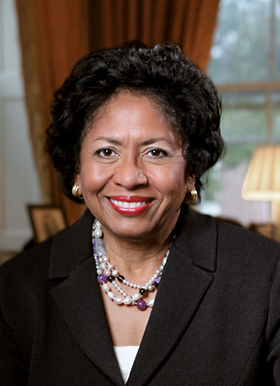
Ruth J. Simmons
Ruth J. Simmons, president of Brown University, was selected to give the 141st Commencement address at Washington University in St. Louis in 2002, titled “Design for Living: Digital Truth and Technicolor Dreams.” Simmons received an honorary doctor of humanities degree in 2002.
The university’s 141st Commencement was held May 10 in Brookings Quadrangle on campus. During the ceremony, which began at 8:30 a.m., Simmons received an honorary doctor of humanities.
“Ruth Simmons is a distinguished leader in American higher education,” said Wrighton. “She is an eloquent speaker and inspires those with whom she interacts. I am delighted that she has accepted our invitation to serve as our Commencement speaker and to receive an honorary degree. In the space of a short period of time she has proven to be an effective leader of one of the finest universities, and I look forward to welcoming her to our community.”
When Simmons was sworn in as the 18th president of Brown University on July 3, 2001, she became the first African American to lead an Ivy League institution as well as Brown’s first woman president. She also holds appointments as professor in the Department of Comparative Literature and the Department of Africana Studies at Brown.
Reflecting on humble beginnings
Simmons’ rise to the Brown presidency has been an extraordinary accomplishment. The 12th child born to sharecroppers in the small East Texas town of Grapeland, Simmons moved with her family to Houston when she was seven years old. There her father found employment as a factory worker and her mother worked as a maid. She has written thoughtfully about those years in an autobiographical essay, “My Mother’s Daughter: Lessons I Learned in Civility and Authenticity,” published in the Texas Journal of Ideas, History and Culture (fall/winter 1998).
With strong family and community support, Simmons earned her bachelor’s degree summa cum laude at Dillard University in New Orleans (1967) and her master’s and doctorate in Romance languages and literatures at Harvard University (1970 and 1973, respectively). Her effort to understand how her own society could countenance racial cruelty and legally enforced segregation led her to a lifelong interest in humanities and other cultures. She studied in Mexico and France and later served as an interpreter for the U.S. State Department.
Pursuing a lifelong interest in humanities
Simmons began her academic career at the University of New Orleans as an assistant professor of French and later served as assistant dean of the College of Liberal Arts. She moved to California State University in Northridge in 1977 as a visiting associate professor of pan-African studies and the acting director of international programs. From 1979 to 1983, she was assistant and later associate dean of graduate studies at the University of Southern California.
She has written on the works of poets David Diop and Aime Cesaire, who championed an influential movement to restore the cultural identity of black Africans, and is the author of a book on education in Haiti.
Igniting change in higher education
In 1983 she joined the Princeton University administration, where she directed Afro-American studies and rose to become associate dean of the faculty. She remained at Princeton for seven years, leaving in 1990 for two years to serve as provost at Spelman College in Atlanta. Simmons returned to Princeton as vice provost, a position she held until June 30, 1995.
As Princeton’s vice provost, she was deputy to the provost and executive secretary of the Priorities Committee, the university’s budget committee. Invited by the president to review the state of race relations on the Princeton campus, Simmons wrote a report in 1993 that led to the university creating an ombudsman’s office to handle complaints, refocusing the affirmative action office, and writing a diversity statement. The plan became a model for campuses nationwide.
In 1995, she became president of Smith College, the largest women’s college in the United States. Simmons has worked tirelessly toward opening higher education — particularly elite private institutions — to disadvantaged minorities, a mission she has described as “a matter of national salvation.” At Smith, she established the nation’s first engineering program at a women’s college and started Meridians, a journal focusing on the concerns of minority women.
Recently, she has spoken and written on a wide array of educational and public policy issues, including diversity, liberal arts, science education, and the role of women in society.
Her achievements in higher education have brought her dozens of honors and awards, including Danforth and Fulbright fellowships, the German DAAD, and honorary degrees from numerous colleges and universities, including Amherst College, Dillard University, the University of Massachusetts at Amherst, Dartmouth College, Princeton University, Northeastern University, Boston University, Mount Holyoke College, University of Pennsylvania and New York University.
She was awarded the Centennial Medal from Harvard University in 1997, the Teachers College Medal for Distinguished Service from Columbia University in 1999, and the President’s Award from the United Negro College Fund in 2001.
Active in a wide range of educational, charitable and civic endeavors, Simmons serves as a member of the National Academy of Arts and Sciences, the American Philosophical Society and the Council on Foreign Relations, and she is on a number of boards, including the Carnegie Corporation, Pfizer Inc., Texas Instruments and The Goldman Sachs Group.